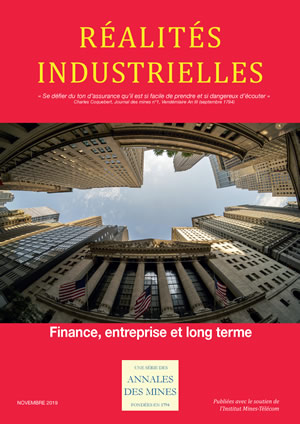| |

|
|
 Novembre 2019 - Finance, entreprise et long terme Novembre 2019 - Finance, entreprise et long terme
Financial Regulation and Externalities: Efficiency vs Politics
Par Gérard HERTIG
ETH Zurich
Fundamentally, financial regulation aims at facilitating access to finance.
From an efficiency perspective, this means that entrepreneurs as well as consumers should get financing at competitive rates. However, the rewards of financial regulation are not necessarily equally distributed, an externality that is likely to favor some financial intermediaries or industrial firms over others. Financial crisis regulation tackles externalities more directly. In particular, prudential regulation generally targets those firms that are most likely to be a source of systemic risk – The aim being to impose the internalization of externalities.
However, efficiency is not the sole driver of financial regulation. Lawmakers and enforcement agents may favor specific interest groups or take into account fairness considerations. This kind of intervention is likely to produce externalities by having an impact on the production and distribution of goods and services. In particular, regulatory interventions to facilitate access to finance in specific industries is likely to distort competition within or across industries.
 Télécharger gratuitement l'article Télécharger gratuitement l'article
 Retour au sommaire Retour au sommaire
 November 2019 - Finance, firms and the long run November 2019 - Finance, firms and the long run
Financial Regulation and Externalities: Efficiency vs Politics
Gérard Hertig,
ETH Zurich
Fundamentally, financial regulation aims at facilitating access to finance.
From an efficiency perspective, this means that entrepreneurs as well as consumers should get financing at competitive rates. However, the rewards of financial regulation are not necessarily equally distributed, an externality that is likely to favor some financial intermediaries or industrial firms over others. Financial crisis regulation tackles externalities more directly. In particular, prudential regulation generally targets those firms that are most likely to be a source of systemic risk ˗ the aim being to impose the internalization of externalities.
However, efficiency is not the sole driver of financial regulation. Lawmakers and enforcement agents may favor specific interest groups or take into account fairness considerations. This kind of intervention is likely to produce externalities by having an impact on the production and distribution of goods and services. In particular, regulatory interventions to facilitate access to finance in specific industries is likely to distort competition within or across industries.
 Retour au sommaire Retour au sommaire
|
|




